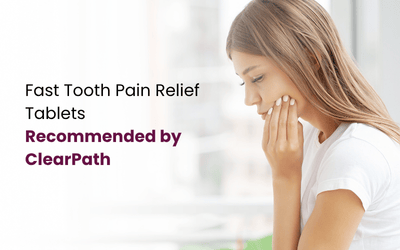
Fast Tooth Pain Relief Tablets
Recommended by ClearPath
Best Teeth Pain Tablets in Pakistan
Tooth pain can appear suddenly and become extremely uncomfortable, especially when the pain is caused by cavities, gum infection, wisdom tooth eruption, or nerve irritation. Many people search for the best medicine for tooth pain to get fast relief while they prepare for or wait for a dental appointment. Painkillers can reduce inflammation and discomfort for a short period, but the real treatment always depends on the underlying dental issue. In Pakistan, different pain tablets are commonly used for toothache, but not every medicine is suitable for every person. This guide explains safe pain relief choices and when to see a dentist for proper care.
Read More: Pakistan’s First DRAP Approved Clear Aligner
What Causes Tooth Pain?
Tooth pain usually happens when the inner part of the tooth, called the pulp, becomes inflamed or irritated. This can occur due to:
Dental cavities
Gum infection
Tooth fracture
Nerve exposure
Wisdom tooth eruption
Tooth sensitivity
Dental abscess (infection)
Painkillers can help with temporary comfort, but long-term relief only comes from a dentist’s evaluation and treatment. Self-medication should always be limited and monitored, especially if pain lasts more than 24 to 48 hours.
Choosing the Best Medicine for Tooth Pain
To choose the best medicine for toothache, patients should understand which tablets are safe for general use and which ones need a dentist’s supervision.
When to Use Painkillers
Pain tablets are helpful when:
Dental pain is sudden and temporary
You need relief before a clinic visit
There is inflammation or swelling
Wisdom tooth eruption is causing discomfort
Safety Tips Before Taking Tablets
Always take the lowest effective dose
Avoid mixing more than one painkiller at once
People with ulcers, kidney disease, or blood pressure problems should be cautious
Pregnant women must consult a doctor before taking any painkiller
Over-the-Counter vs Prescription Options
| Category | When to use |
|---|---|
| OTC (Common pharmacy medicines) | Mild to moderate tooth pain |
| Prescription-only medicines | Severe pain, swelling, or suspected infection |
Below is a patient-friendly list of commonly used pain tablets for toothache in Pakistan, along with their uses, benefits, and cautions.
1. Ansaid
Works well for inflammation-based tooth pain
Helps reduce swelling and irritation
Best for mild to moderate pain
Not suitable for people with stomach ulcers
2. Synalgo
A popular tablet for severe tooth pain
Strong relief when normal painkillers don’t work
Must be taken responsibly under medical guidance
Not suitable for long-term self-use
3. Ibuprofen
Easily available and effective
Helps with swelling and gum pain
Often recommended as a first-choice painkiller
Should be avoided in patients with kidney issues
4. Torex IR
Useful for stronger pain management
Usually recommended for acute pain cases
Should not be taken without guidance if you have gastric issues
5. Panadol
Safe and gentle on the stomach
Works best for mild to moderate toothache
Suitable for children and adults
Can be used when other NSAIDs are not tolerated
6. Naproxen
Good for long-lasting pain relief
Helps reduce deep inflammation
Should be used with caution in gastric patients
7. Diclofenac
A powerful anti-inflammatory tablet
Offers quick relief from severe dental pain
Should be avoided in heart patients unless prescribed
8. Celecoxib
Used for pain linked to swelling
Gentler on the stomach than traditional NSAIDs
Recommended only after consultation for longer use
9. Tramadol (Prescription Strength)
Used for strong tooth pain not controlled by OTC medicines
Should only be taken when prescribed
Not for self-medication or casual use
10. Mefenamic Acid
Useful for wisdom tooth irritation and gum swelling
Provides fast relief for moderate dental pain
Should not be taken with other NSAIDs
11. Ketorolac (Prescription Strength)
Very strong painkiller used in dental emergencies
Commonly given after tooth extraction or severe pain episodes
Must be supervised by a dentist or physician
Natural Remedies Alongside Painkillers
Natural soothing methods can help alongside medicine for comfort:
| Natural Remedy | Benefit |
|---|---|
| Saltwater rinse | Reduces swelling and cleans the mouth |
| Clove oil | Natural analgesic for mild toothache |
| Cold compress | Numbs pain and reduces inflammation |
When to See a Dentist
Painkillers only manage symptoms, not the cause. You should visit a dentist if:
Pain lasts more than 48 hours
Swelling or pus is present
Pain keeps returning
There is bleeding or fever
You have difficulty chewing or opening the mouth
Ignoring dental pain can lead to infection, nerve damage, and even tooth loss. Proper treatment can only be advised after a physical examination.
Expert Dental Care from ClearPath Orthodontics
ClearPath Orthodontics provides dental guidance, oral care awareness, and aligner-based orthodontic treatment using advanced digital technology. If your tooth pain comes from crowding, bite issues, or misalignment, clear aligners may be part of the long-term smile correction plan.
You can consult ClearPath Orthodontics for:
Diagnosis and treatment planning
Pain assessment
Orthodontic aligner therapy
Long-term preventive dental care
Final Thoughts
The best medicine for tooth pain depends on the severity of pain, overall health, and underlying dental issue. Painkillers can help temporarily, but professional treatment is necessary for lasting relief. Always consult a dental expert instead of depending only on tablets. The safest approach is early diagnosis and personalized care.
